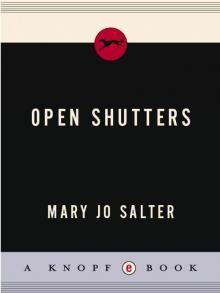Read Open Shutters Storyline:
Mary Jo Salter’s sparkling new collection, Open Shutters, leads us into a world where things are often not what they seem. In the first poem, “Trompe l’Oeil,” the shadow-casting shutters on Genoese houses are made of paint only, an “open lie.” And yet “Who needs to be correct / more often than once a day? / Who needs real shadow more than play?” Open Shutters also calls to mind the lens of a camera—in the villanelle “School Pictures” or in the stirring sequence “In the Guesthouse,” which, inspired by photographs of a family across three generations, offers at once a social history of America and a love story. Darkness and light interact throughout the book—in poems about September 11; about a dog named Shadow; about a blind centenarian who still pretends to read the paper; about a woman shaken by the death of her therapist. A section of light verse highlights the wit and grace that have long distinguished Salter’s most serious work. Fittingly, the volume fools the eye once more by closing with “An Open Book,” in which a Muslim family praying at a funeral seek consolation in the pages formed by their upturned palms.Open Shutters is the achievement of a remarkable poet, whose concerns and stylistic range continue to grow, encompassing ever larger themes, becoming ever more open. From the Hardcover edition.From BooklistOpenness and transparency take many forms in this lucid collection. A woman looks through an unshuttered window and watches a wary hare succumb to the sensuous spell of the grass' sweet fragrance. Old photographs are portals to the past; an ultrasound provides a glimpse into the future. The pages of books and newspapers open to reveal new worlds, and hands open, too, in gestures of giving and receiving. Once again Salter, whose last collection was the radiant A Kiss in Space (1999), performs with deep pleasure and arresting artistry the paired arts of avid observation and the transformation of hectic experience into crystalline images, golden threads of narrative, and startling extrapolations. In poems such as "The Accordionist," in which a gypsy boy boards a Metro train to serenade stoic passengers, and "TWA 800," in which a postcard survives a deadly plane crash, Salter's moves are so precise and gravity-defying, so astonishingly eloquent, the exhilarated reader feels as though she's watching a gymnast perform intricate, risky, and unpredictable sequences, nailing each one perfectly. Donna SeamanCopyright © American Library Association. All rights reservedReviewOpen Shutters (2003)“[Salter] . . . challenges us with the discovery that something lucid, forthright, and fantastically undisheveled might also be sublime.”–Stephen Metcalf, *New York Times Book Review “Salter . . . performs with deep pleasure and arresting artistry the paired arts of avid observation and the transformation of hectic experience into crystalline images, golden threads of narrative, and startling extrapolations . . Salter’s moves are so precise and gravity-defying, so astonishingly eloquent, the exhilarated reader feels as though she’s watching a gymnast perform intricate, risky, and unpredictable sequences, nailing each one perfectly.–Donna Seaman, Booklist “A mature poet at the top of her form. . . Delightful.”–Rochelle Ratner, Library Journal* A Kiss in Space (1999)“The book of poetry I loved best this year was A Kiss in Space, full of moving adventurous work.”–Les Murray, *Times Literary Supplement "These are poems of breathtaking elegance: in formal control, in intellectual subtlety, in learning lightly displayed."–Carolyn Kizer Sunday Skaters (1994)“A beautiful book, a major phase in the career of an important poet . . . In these poems a quality of close but apparently effortless observation is backed up by a strong and deep moral sense.”–Henry TaylorUnfinished Painting (1989)“Mary Jo Salter’s work embodies the marriage of superb craftsmanship to the tragic sense of reality, which is the formula of true poetry.”–Joseph Brodsky Henry Purcell in Japan *(1985)“A poetry full of alertness, tact, credible feeling, and an unforced gaiety of form . . . For all her modesty of tone, she has a range of awareness and response, which, in a time when much poetry has shrunk to the merely personal, is refreshingly large.”–Richard WilburPages of Open Shutters :
